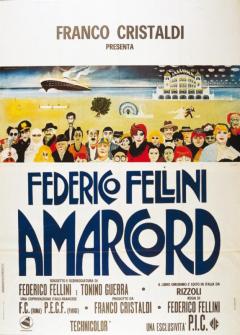






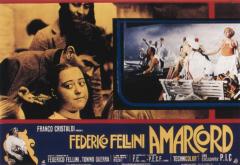
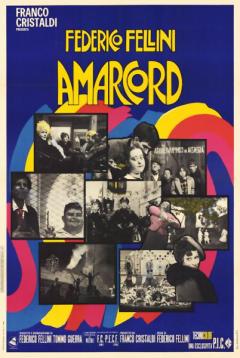

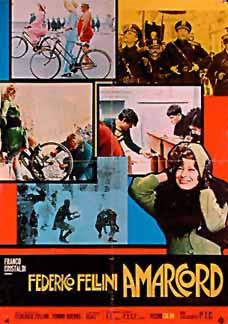
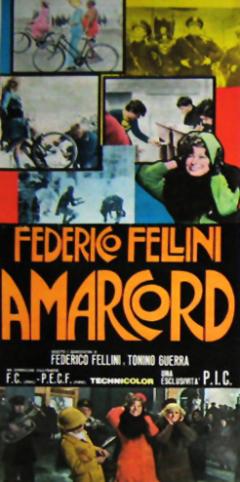
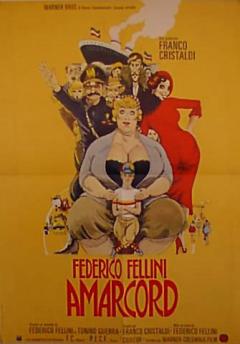





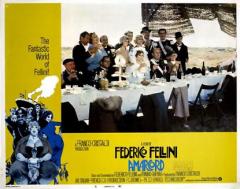
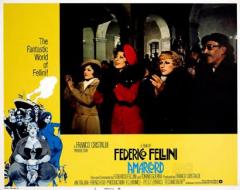
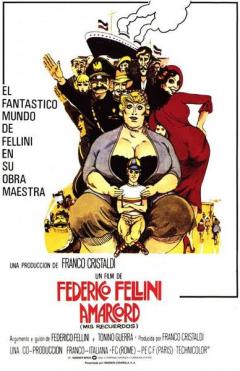
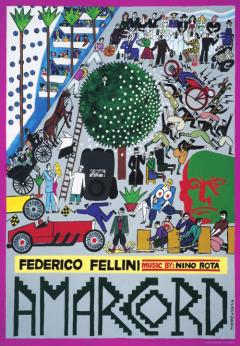
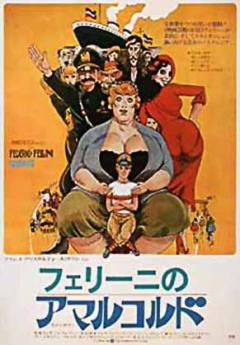
Amarcord
The film is set in the thirties in Rimini. Titta is a teenager who is growing up with a Catholic education and the Fascist rhetoric. His father Aurelio is an anarchical and antifascist master mason, who has to support his two sons, his wife, his lively old father, as well as his brother-in-law - uncle ‘Pataca’ – who is a boaster and a loafer. His brother Teo is shut up in a mental hospital. The inhabitants of the town are very peculiar: Volpina, a nymphomaniac, Giudizio, the town idiot, Biscein, the town’s inveterate liar, the exhibitionist motorcyclist, the blind man who’s playing the accordion relentlessly. Titta attends the local high school, where his teachers and friends are busy with oral tests and jokes alternatively. Titta's sentimental education is divided between the unreachable Gradisca, the village beauty - a stout and buxom tobacconist - and summer dancing at the Grand Hotel, that he spies on behind the fences. Titta shares the passing of seasons, the fireworks welcoming the Spring, and the events like the Mille Miglia and the passing of the Transatlantic Rex, the visit of the Fascist party official and heavy snowfalls with his neighbourhood or borgo. With the death of Titta’s mother and Gradisca’s wedding his adolescence comes to an end.
Crew
Cast
Awards
Peculiarites
Reviews
- strict warning: Only variables should be passed by reference in /home/fellini/domains/federicofellini.it/public_html/sites/all/modules/date/date_api.module on line 866.
- strict warning: Only variables should be passed by reference in /home/fellini/domains/federicofellini.it/public_html/sites/all/modules/date/date_api.module on line 866.
- strict warning: Non-static method view::load() should not be called statically in /home/fellini/domains/federicofellini.it/public_html/sites/all/modules/views/views.module on line 906.
- strict warning: Declaration of views_handler_argument::init() should be compatible with views_handler::init(&$view, $options) in /home/fellini/domains/federicofellini.it/public_html/sites/all/modules/views/handlers/views_handler_argument.inc on line 744.
- strict warning: Declaration of semanticviews_plugin_style_default::options() should be compatible with views_object::options() in /home/fellini/domains/federicofellini.it/public_html/sites/all/modules/semanticviews/semanticviews_plugin_style_default.inc on line 232.
- strict warning: Declaration of views_plugin_row::options_validate() should be compatible with views_plugin::options_validate(&$form, &$form_state) in /home/fellini/domains/federicofellini.it/public_html/sites/all/modules/views/plugins/views_plugin_row.inc on line 134.
- strict warning: Declaration of views_plugin_row::options_submit() should be compatible with views_plugin::options_submit(&$form, &$form_state) in /home/fellini/domains/federicofellini.it/public_html/sites/all/modules/views/plugins/views_plugin_row.inc on line 134.
- strict warning: Declaration of semanticviews_plugin_row_fields::options_validate() should be compatible with views_plugin_row::options_validate($form, &$form_state) in /home/fellini/domains/federicofellini.it/public_html/sites/all/modules/semanticviews/semanticviews_plugin_row_fields.inc on line 117.
- strict warning: Non-static method view::load() should not be called statically in /home/fellini/domains/federicofellini.it/public_html/sites/all/modules/views/views.module on line 906.
- strict warning: Declaration of views_handler_filter::options_validate() should be compatible with views_handler::options_validate($form, &$form_state) in /home/fellini/domains/federicofellini.it/public_html/sites/all/modules/views/handlers/views_handler_filter.inc on line 607.
- strict warning: Declaration of views_handler_filter::options_submit() should be compatible with views_handler::options_submit($form, &$form_state) in /home/fellini/domains/federicofellini.it/public_html/sites/all/modules/views/handlers/views_handler_filter.inc on line 607.

